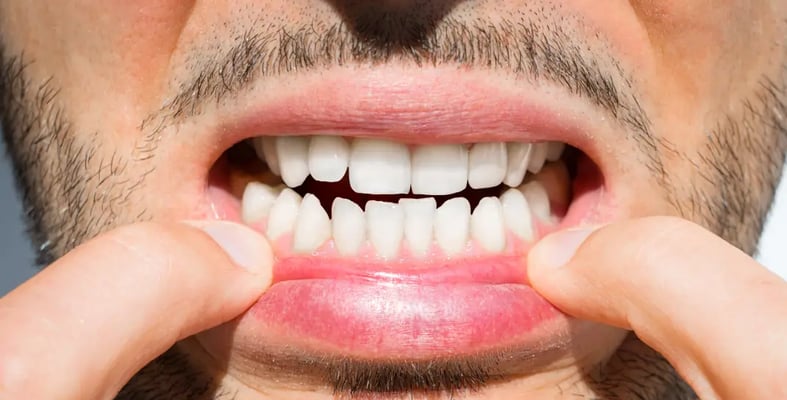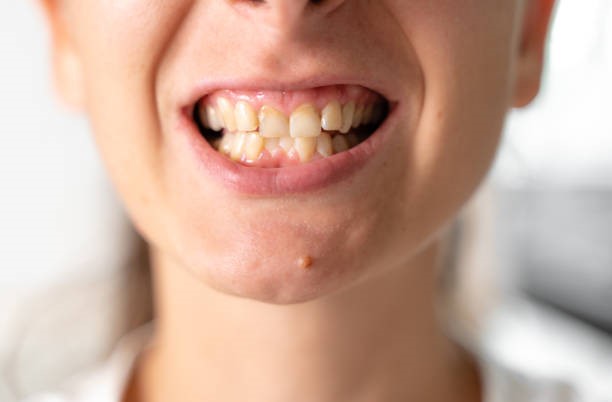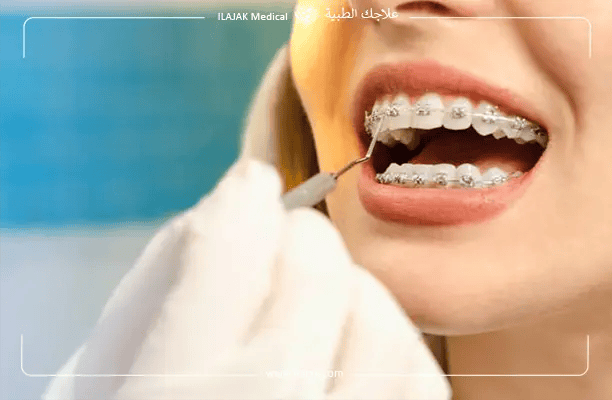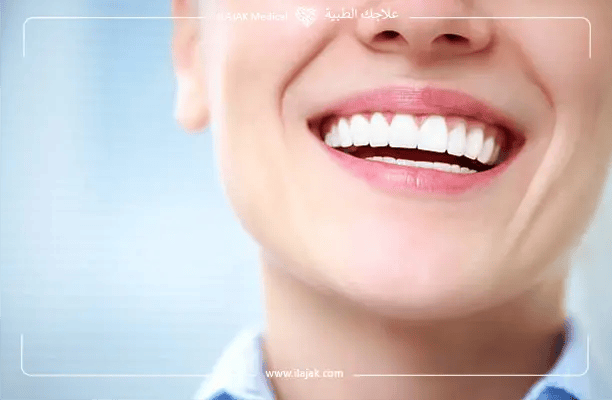Crooked Teeth: Causes and Treatment

Do your smile and oral health suffer as a result of your crooked teeth? If so, you are not by yourself.
The difficulty of having overcrowded teeth brought on by various circumstances affects a lot of people.
In this comprehensive guide, we examine the underlying reasons for crooked teeth, the possible problems they may create, and the variety of corrective procedures, including crowded teeth braces and teeth-straightening surgery, that are available.
We'll also provide information on treatment costs for anyone thinking about getting their teeth straightened in Turkey. Join us on this adventure as we learn how to have a straighter, healthier smile!
What Causes Crooked Teeth?
Crooked teeth can result from various factors. Understanding the causes can help you identify the root of the problem and explore appropriate treatment options. Here are the main causes of crooked teeth:
1. Genetics
Genetics plays a significant role in tooth alignment. If your parents have crowded teeth or other dental issues, there's a higher chance you may experience the same.
Inherited traits can affect jaw size, tooth size, and even the number of teeth, hyperdontia (too many teeth), leading to misalignment.
2. Thumb Sucking
Thumb sucking is a common habit among infants and young children.
Prolonged thumb sucking can cause the teeth to shift position, leading to moderate crowding teeth.
Read more: Freddie Mercury's Teeth: The Unique Story Behind The Iconic Smile
The intensity and duration of thumb-sucking play a role in determining the extent of misalignment.
3. Tongue Thrusting
Tongue thrusting refers to the habit of pushing the tongue against the front teeth while swallowing or speaking.
This repetitive pressure can affect tooth alignment, especially in children whose permanent teeth are still developing.
4. Lack of dental hygiene
Gingivitis, the first stage of gum disease, can develop if adequate oral hygiene practices are not followed.
The majority of American individuals aged 30 and older, according to research in the Journal of Dental Research, have gum disease to some extent.
Periodontitis, a more serious illness that can lead to tooth loss or misalignment if left untreated, can develop from gingivitis if it is not addressed.
Adopting good oral hygiene habits will protect your dental health and stop gum disease from progressing.
5. Malnutrition
Proper nutrition plays a pivotal role in fostering the growth and strength of your muscles, bones, and tissues.
Neglecting to provide your body with essential nutrients can lead to various health concerns, including the development of overcrowded teeth.
Discover how prioritizing a well-balanced diet can positively impact your oral health and overall vitality.
6. Facial trauma
Like a childhood jaw injury, can have long-lasting effects on your dental well-being.
Displaced teeth or misaligned bites often occur as a result of the jaw shifting from its original position, leading to crooked tooth growth.
Additionally, facial injuries can contribute to tooth loss, creating open spaces in the jaw. In response, neighboring teeth may shift to fill those gaps.
Understanding the connection between facial injuries and dental health is crucial for maintaining a proper bite and a confident smile.

Problems Caused by Crooked Teeth
Crooked teeth can lead to several oral health problems and impact your overall well-being. Some of the issues associated with crooked teeth include:
- Increased risk of tooth decay: Crooked teeth are more challenging to clean properly, making them more susceptible to plaque buildup and tooth decay.
- Gum disease: Maintaining optimal oral care becomes a challenging task when dealing with crowded or crooked teeth. The early stage of gum disease, known as gingivitis, manifests through symptoms like itchiness, irritation, and swelling of the gums. Gingivitis, if left untreated, can develop into periodontitis. Periodontitis is a condition that damages the bone that supports the teeth, and can lead to tooth loss and bone loss. Additionally, misaligned teeth can create pockets where harmful bacteria can gather, increasing the vulnerability to gum disease. It is crucial to address these challenges and prioritize proper oral hygiene to prevent and manage gum disease effectively.
- Difficulty cleaning teeth : Cleaning teeth becomes a challenge when they are crooked, as traditional toothbrush bristles and floss struggle to reach the tight spaces and crevices. This can create a breeding ground for bacteria and contribute to oral health issues.
- Self-esteem issues: Crooked teeth can impact your self-confidence and hinder you from smiling or speaking confidently. After all, our smile reflects our personality. In addition, poor dental hygiene can lead to discolored teeth that make people feel uncomfortable. These are some of the top reasons people choose cosmetic dentistry.
How to Fix Crooked Teeth?
If you're looking to overcrowded teeth treatment, various options are available. The choice of treatment depends on the severity of misalignment and your specific dental needs. Here are the two primary methods for fixing crooked teeth:
Dental Braces
Crowded teeth braces are a tried and tested solution for correcting severe crowding teeth. They consist of brackets bonded to the teeth and connected by arch wires, which gradually apply pressure to shift the teeth into proper alignment.
Braces can address various types of tooth misalignment, from mild to severe cases, and there's many types of braces include: Metal Braces, Ceramic Braces, invisible.
Read more: Orthodontic Treatment In Turkey
Depending on how hard the situation is, the average length of time for braces therapy is a few months to a few years.
The orthodontist must be seen frequently to make changes and track progress.
A retainer could be advised to keep the new tooth position once the braces are taken off.
- Retainers
There are two types of them: removable and fixed. They are much cheaper than braces and require fewer visits to the dentist.
Teeth-Straightening Surgery
In some cases of severe misalignment or when braces alone are insufficient, teeth-straightening surgery may be recommended.
This surgical procedure involves repositioning the jaw or reshaping the jawbone to achieve proper alignment.
Orthognathic surgery is a common surgical approach for correcting more severe bite issues.
Teeth-straightening surgery is typically performed by an oral and maxillofacial surgeon in collaboration with an orthodontist.
It requires careful planning and evaluation before undergoing the procedure.
Recovery time varies depending on the complexity of the surgery, and post-operative care is crucial for optimal results.
Veneers and crowns
Veneers are an excellent option for correcting slightly crooked or crowded teeth.They primarily focus on enhancing the appearance rather than actually straightening the teeth.
Veneers are thin covers made of either composite or porcelain material, carefully applied to the front surface of the teeth, giving them a straighter appearance.
On the other hand, dental crowns involve more extensive tooth restructuring.
This process includes removing a significant amount of healthy tooth structure to accommodate the fitting of a porcelain or metal crown over the existing teeth.
While dental crowns can be effective, they are generally considered a less preferable option due to the substantial removal of healthy tooth material that is required.

How Much Does It Cost to Straighten Teeth in Turkey?
In Turkey, the pricing for metal dental braces typically ranges from 1500 to 2000 €.
If you prefer ceramic dental braces, you can expect the cost to be between 1500 and 2500 €.
For those interested in lingual dental braces, the price range is slightly higher, varying from 1500 to 3000 €.
Alternatively, if you opt for Invisalign, the cost will typically fall within the range of 3000 to 5000 €.
It's important to note that these prices may vary depending on individual clinics and specific treatment requirements.

Special package deals by ILAJAK
Do you need professional guidance or treatment because your crowded teeth? Look no farther than the expert dental services provided by ILAJAK Medical.Our highly trained medical professionals are prepared to address the root causes of overcrowding teeth and offer practical methods to manage and organize your dental needs.
Comprehensive information will be given to you by our knowledgeable specialists.
We will talk about the root causes of overcrowding, look at various treatment approaches, and weigh the advantages, costs, and potential downsides of each strategy.
You will know exactly what to anticipate and the advantages you stand to gain.
At ILAJAK Medical, we are aware of the fact that a number of circumstances may affect your decision to receive dental care.
We take into account your dental health as well as your preferences and financial situation.
You can compare the benefits of various procedures that are suited to your particular dental needs with our assistance.
We are available to help you make the right decision for your dental health.
Regardless of the course of treatment you decide on, ILAJAK Medical is dedicated to you excellent care.
In terms of the final product's visual appeal and use, our aim is to surpass your expectations.
Leave your dental worries behind and embrace a smile that exudes beauty and self-assurance.
Contact ILAJAK Medical today and let us transform your smile into a masterpiece that reflects your self-assurance and elegance.
Our dedicated team of professionals is eager to assist you at every step. Don't hesitate any longer – your perfect smile is just a consultation away!
cooked teeth faqs
For each person, the length of time it takes for dental braces to produce noticeable effects might vary. As the first month comes to a close, you might notice a slight shift in the position of your teeth. The intended result usually takes between 12 and 24 months if you have a mild to moderate misalignment. The length of the therapy, nevertheless, could be prolonged in more serious situations. Your orthodontist will thoroughly evaluate your unique circumstances and develop a tailored treatment plan for you that includes an anticipated timeline.
Adults and older teens with fully formed jaws are often good candidates for teeth-straightening surgery. The particular eligibility for surgery relies on the patient's general dental health and the severity of the misalignment. To find out if you're a candidate for the operation, you must have a consultation with an oral and maxillofacial surgeon.
For minor to moderate dental misalignment, clear aligners, like Invisalign, are an alternative to conventional braces. Since they are detachable and nearly unnoticeable, they offer a more covert treatment alternative. However, complicated instances or severe misalignment may not be appropriate candidates for clear aligners. Your orthodontist will assess your situation and suggest the best course of action.
slight tooth misalignment may not always necessitate treatment if it has no substantial negative effects on your dental health or appearance. To evaluate your unique situation, it's crucial to speak with a dentist or orthodontist. They can decide whether medical intervention is required to stave against future issues.




Treatment Services
In the Best Medical Centers
Contact Us
Please fill the form below and describe your condition, We will contact you back
- Dental Treatment
- Hair Transplant
- Obesity Surgery
- Vision Correction
- Health Resorts
- Other Medical Services
- No elements found. Consider changing the search query.
- List is empty.
Your personal data is processed as indicated in the general statement text and by continuing, you explicitly consent to the processing

